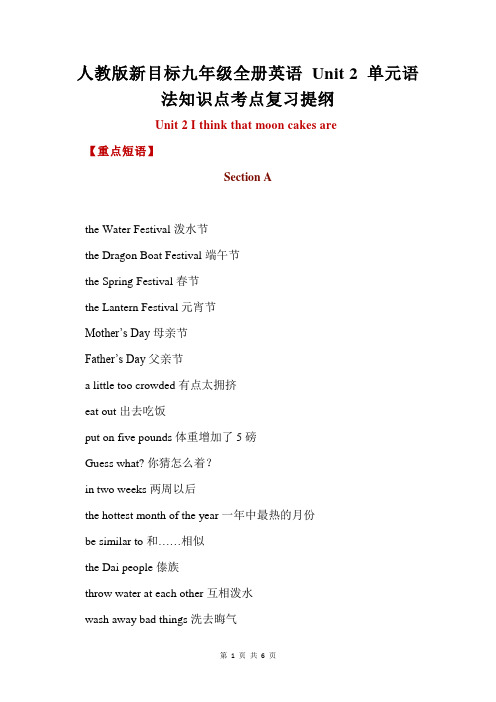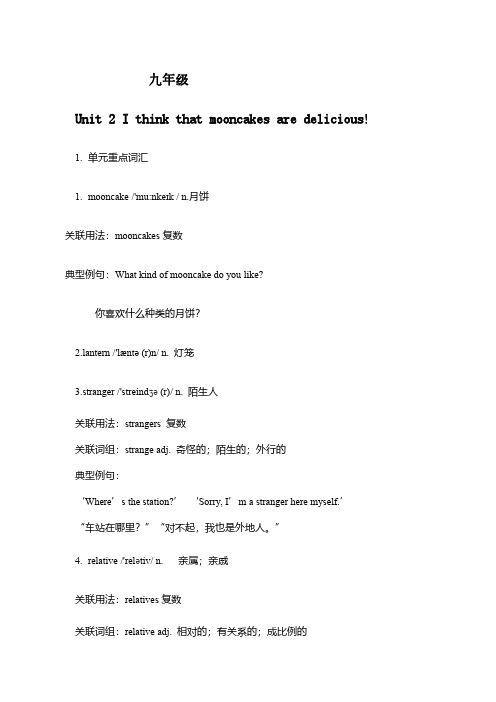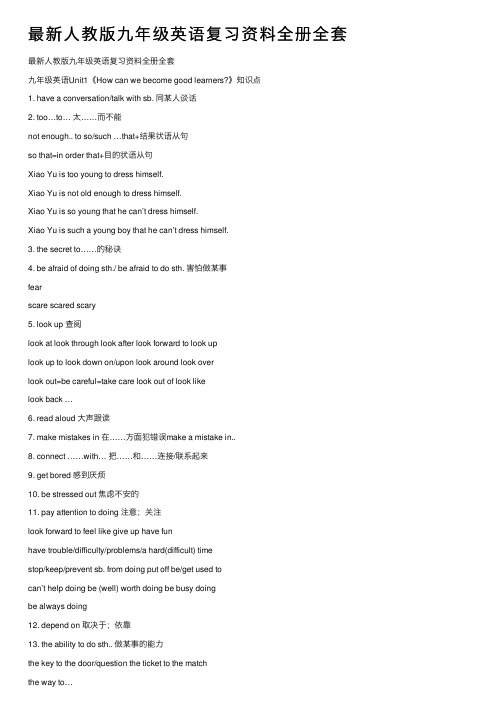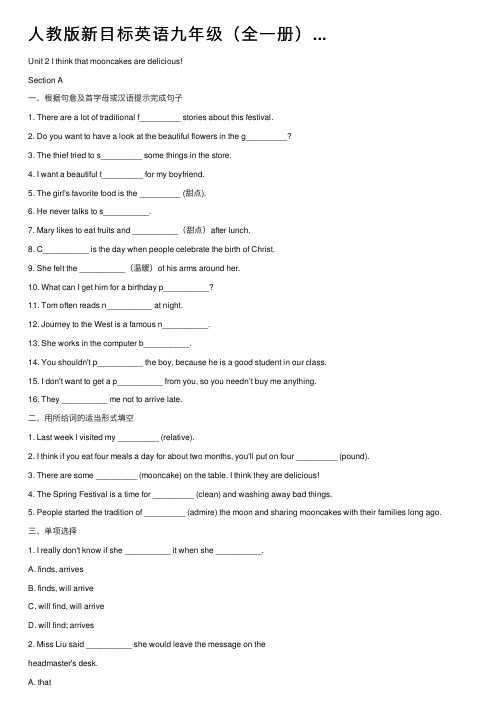人教版新目标九年级全册英语复习资料
人教版新目标九年级全册英语 Unit 2 单元语法知识点考点复习提纲

人教版新目标九年级全册英语Unit 2 单元语法知识点考点复习提纲Unit 2 I think that moon cakes are【重点短语】Section Athe Water Festival 泼水节the Dragon Boat Festival 端午节the Spring Festival 春节the Lantern Festival 元宵节Mother’s Day母亲节Father’s Day父亲节a little too crowded 有点太拥挤eat out 出去吃饭put on five pounds 体重增加了5磅Guess what? 你猜怎么着?in two weeks 两周以后the hottest month of the year 一年中最热的月份be similar to 和……相似the Dai people 傣族throw water at each other 互相泼水wash away bad things 洗去晦气have good luck in the new year 在新的一年交好运celebrate the Mid-Autumn Festival 庆祝中秋节in the shape of a full moon 一轮满月的形状on the Mid-Autumn night 在中秋节的晚上traditional folk stories 传统民间故事shoot down 射下magic medicine 仙药live forever 长生不老plan to do sth. 计划做某事refuse to do sth. 拒绝做某事lay out 摆开;布置start the tradition of ... 开始……的传统admire the moon 赏月Section Btrick or treat 不给糖就捣乱light candles 点燃蜡烛play a trick on sb. 捉弄某人give sb. a treat 款待某人dress up as cartoon characters 装扮成卡通人物the true meaning of Christmas 圣诞节的真正含义care about 关心;在意make more money 赚更多的钱Christmas Eve 平安夜business partner 生意伙伴warn sb. to do sth. 警告某人做某事end up 最终成为;最后处于expect sb. to do sth. 期待某人做某事take him back to his childhood 把他带回到童年remind sb. of sth. 提醒某人某事wake up 叫醒decide to do sth. 决定做某事promise to do sth. 承诺做某事celebrate Christmas with his relatives 和他的亲戚们一起庆祝圣诞节give gifts to people in need 把礼物给需要的人treat everyone with kindness and warmth 对待每一个人都充满善意和温暖spread love and joy 传播爱和快乐【考点详解】。
人教版新目标九年级全一册英语 Unit 3 知识点考点复习提纲

人教版新目标九年级全一册英语Unit 3 知识点考点复习提纲Unit 3 Could you please tell me where the restrooms are?【重点短语】Section Abuy some stamps 买一些邮票get to the bookstore 到书店on one’s right / left 在某人的右边 / 左边beside the bank 在银行旁边turn right / left 右拐 / 左拐between the flower store and the bookstore 在花店和书店之间go past the bookstore 经过书店be excited to do sth. 对做某事感到兴奋try the rides 尝试乘骑项目start with ... 以……开始need to do sth. 需要做某事come on 快点儿hold one’s hand 抓住某人的手at first 首先;最初get hungry 饿了serve delicious food 提供美味的食物on one’s way to ... 在某人去……的路上pass by 路过;经过a rock band 一个摇滚乐队walk up to sb. 向某人走去come a little earlier 早点儿来pardon me 抱歉,对不起;什么,请再说一遍mail a letter 寄信go east 朝东走Section Bvisit a foreign country 去国外游览ask for help politely 礼貌地请求帮助sound less polite / impolite 听起来不怎么礼貌 / 不礼貌a direct question 一个直接的问题in different situations 在不同的情况下depend on 取决于speak to sb. 和某人说话school trip 学校旅行such as 诸如e-mail address 电子邮箱地址lead in to a request 导入请求spend time (in) doing sth. 花费时间做某事trouble sb. 麻烦某人communicate better with other people 更好地与他人交流an underground parking lot 一个地下停车场pass the salt 递一下盐change some money 兑换一些钱go on a short study vacation 去游学an English-speaking country 一个讲英语的国家in a rush 急忙地on time 按时【考点详解】1. ①问路常用的句子:Do you know where is …?Can you tell me how can I get to …?Could you tell me how to get to …?②Can/Could/Will/Would you please tell me sth. 表示十分客气地询问事情③Could you tell me how to get to the park? 请你告诉我怎么才能去邮局好吗?上面句子中的how to get to the park是疑问词与动词不定式连用,用作宾语,但不是宾语从句(这一点要搞清楚,它不是宾语从句),相当于how I can get to the park(宾语从句)I don't know how to solve the problem=I don't know how I can solve the problem. 我不知道如何解决这个问题Can you tell me when to leave? =Can you tell me when I will leave? 你能告诉我什么时候离开?。
人教版新目标初中英语九年级全一册 知识点总结2单元

九年级Unit2I think that mooncakes are delicious!1.单元重点词汇1.mooncake/'mu:nkeɪk/n.月饼关联用法:mooncakes复数典型例句:What kind of mooncake do you like?你喜欢什么种类的月饼?ntern/'læntə(r)n/n.灯笼3.stranger/'streindʒə(r)/n.陌生人关联用法:strangers复数关联词组:strange adj.奇怪的;陌生的;外行的典型例句:‘Where’s the station?’‘Sorry,I’m a stranger here myself.’“车站在哪里?”“对不起,我也是外地人。
”4.relative/'relətiv/n.亲属;亲戚关联用法:relatives复数关联词组:relative adj.相对的;有关系的;成比例的5.put on增加(体重);发胖关联用法:put on:穿上;上演;增加;假装;使…上场关联词组:put away储存(钱);储存…备用;储蓄put back拨回;向后移put down写下;记下;镇压put forward提出(意见、建议)put in打断;插嘴put off延期;推迟典型例句:She put on her coat and went out.她穿上外套,出去了。
Inactive people often put on weight later in life.不好动的人常常会在今后的生活中发胖。
6.pound/paund/n.磅(重量单位);英镑7.folk/fəul k/adj.民间的;民俗的8.goddess/'gɔdes/n.女神9.whoever/huːˈevə/pron.无论谁;不管什么人关联用法:whoever可以写成no matter who典型例句:I’ll take whoever wants to go.谁想去我就带谁去。
人教版新目标 九年级英语全册重点短语和句型总结

九年级重点短语和句型Unit1 How can we become good learners?重点短语1. ask the teacher for help 向老师求助2. work with friends 和朋友一起学习3. study for a test 备考4.have conversations with sb,与……交谈5.read aloud 朗读speak loudly 大声说话6.speaking skills 口语技巧spoken English英语口语7.too…to… 太……而不能8.look up the words in a dictionary 查阅;look up抬头看9.It takes time 慢慢来,不着急10.the 比较级…the 比较级…,越…越…The more you read ,the faster you will be.11.it is adj for sb to do sth.find/think/make it adj (for sb) to do sth发现某人做某事I find it important (for us) to learn English.12.so that 以便,为了13. be afraid of doing sth. / be afraid to do sth. 害怕做某事……14.fall in love with 爱上15.something interesting 有趣的事情16.body language 肢体语言17.expressions on their faces 面部表情18.the secret to ( doing) sth .......的秘诀19.as well 也20.It’s a piece of cake.小菜一碟21.have a better understanding of 对...有更好的理解22.take notes 记笔记23.do sth by doing sth 通过某种方式做某事24.do grammar exercises 做语法习题25.memorize sentence patterns 记句型26.keep a diary 写日记27.make mistakes( in …)在……方面犯错误mistake A for B 错把……当成……28.increase to增加到…/ increase by增加了…29.at a /the speed of 以…的速度30.talk to sb.和某人交谈31,be born with 天生具有32.Whether or not…是否;Whether… or…无论是…还是…33.depend on 依靠依赖34.have something in common 有一些共同之处35.pay attention to (doing) sth 注意关注(做)某事36. connect …with …/ connect …to …把…和…联系37.think about 考虑38.even if 即使尽管纵容39.look for 寻找40.worry about 担心担忧41.word by word 一字一字地42so……that 如此……以至于43.the ability to do sth. 做某事的能力44. practice makes perfect.熟能生巧45 learn from….从/向….学习46.learning habits 学习习惯47.get bored 感到无聊48. be stressed out 焦虑不安的49. instead of 代替…50.over and over again 反反复复地51. from time to time. 有时52. on one’s own 独自一人,依靠自己53. develop one’s study skills.培养某人的学习技巧。
最新人教版九年级英语复习资料全册全套

最新⼈教版九年级英语复习资料全册全套最新⼈教版九年级英语复习资料全册全套九年级英语Unit1《How can we become good learners?》知识点1. have a conversation/talk with sb. 同某⼈谈话2. too…to… 太……⽽不能not enough.. to so/such …that+结果状语从句so that=in order that+⽬的状语从句Xiao Yu is too young to dress himself.Xiao Yu is not old enough to dress himself.Xiao Yu is so young that he can’t dress himself.Xiao Yu is such a young boy that he can’t dress himself.3. the secret to……的秘诀4. be afraid of doing sth./ be afraid to do sth. 害怕做某事fearscare scared scary5. look up 查阅look at look through look after look forward to look uplook up to look down on/upon look around look overlook out=be careful=take care look out of look likelook back …6. read aloud ⼤声跟读7. make mistakes in 在……⽅⾯犯错误make a mistake in..8. connect ……with… 把……和……连接/联系起来9. get bored 感到厌烦10. be stressed out 焦虑不安的11. pay attention to doing 注意;关注look forward to feel like give up have funhave trouble/difficulty/problems/a hard(difficult) timestop/keep/prevent sb. from doing put off be/get used tocan’t help doing be (well) worth doing be busy doingbe always doing12. depend on 取决于;依靠13. the ability to do sth.. 做某事的能⼒the key to the door/question the ticket to the matchthe way to…14. good learners 优秀的学习者15. work with friends 和朋友⼀起学习work in groups16. study for a test 备考17.speaking skills ⼝语技巧spoken English英语⼝语18.a little=a bit=a little bit=kind of 有点⼉19.at first 起初起先first of all at the beginning ofto start with20.because of 因为because +原因状语从句21.as well 也,too, eitheralso22.the meaning of ……的意思What’s the meaning of the word?What does the word mean?What do you mean by the word?23.in common 共有的have… in common24.for example 例如for instancesuch as列举25.think about 考虑think over 仔细考虑think hard 苦苦思索think of26.even if/though 即使尽管纵容27.worry about=be worried about 担⼼担忧be nervous about be anxious about be excited aboutbe serious about be relaxed about28.make word cards 制作单词卡⽚29.ask the teacher for help 向⽼师求助ask for30.give a report 作报告31.word by word ⼀字⼀字地little by little one by onestep by step32.fall in love with 爱上fall-fell-fallenfall down 跌倒fall down from= fall off从..掉下来fall over 绊倒fall into 落⼊33.something interesting 有趣的事情修饰不定代词的形容词后置不定代词作主语谓语动词⽤单三34.take notes 记笔记write down35.how often 多久⼀次How soon多久以后How longHow far How much How many..36.a lot of=lots of= plenty of 许多37.learning habits 学习习惯eating habbits38.be interested in=take an interest in 对……感兴趣39.be good at=do well in 在……⽅⾯擅长be bad at do badly in be weak in40.each other 彼此互相one another41.instead of +n./pron./doing 代替⽽不是42. by doing sth 通过做某事43.it +be+adj/n.+for(of) sb.+to do sth 做某事是……的44.finish doing sth 完成某事finish/practice/enjoy/mind/ suggest/avoid/consider/stand45.what/how about doing sth?做某事怎么样?46.try to do sth 尽⼒做某事try one’s best to dotry doing try on try out47.the +⽐较级,the+⽐较级越……,就越……⽐较级+and +⽐较级as…as not as… as48.find it+adj+to do sth 发现做某事49.help sb (to) do sth 帮助某⼈做某事help-helpfulhelp sb. with give sb. a hand= do sb. a favorhelp out help oneself 请⾃便with the help of sb. == with one's help 在某⼈的帮助下50.keep doing sth ⼀直做某事keep sb. +adj.51.begin/start to do sth 开始做某事begin/start doing sth.52.want to do sth.=would like to do=feel like doing 想要做某事53.need to do sth 需要做某事need doing=need to be done54.remember to do sth 记得做某事remember doing sth.forget to do sth forget doing sth55. 提建议的句⼦:①What/ how about +doing sth.? 做…怎么样?(about后⾯要⽤动词的ing形式,这⼀点考试考的⽐较多)如:What/ How about going shopping?②Why don't you + do sth.? 你为什么不做…?(注意加⿊的部分⽤的是动词的原型)如:Why don't you go shopping?③Why not + do sth. ? 为什么不做…?(注意加⿊的部分⽤的是动词的原型)如:Why not go shopping?④Let's + do sth. 让我们做…吧。
(完整版)人教版新目标九年级全册英语复习资料

九年全册英复料◆unit1 How do you study for a test?一.复重点1.目言: talk about how to study,2.要求背部分 P3G ,P4-3a, P6-3a, P8-reading3.背表。
1. 4.复教材所有内容,复所做的,侧重基目。
二.知点:1.frustrate,frustrating,frustrated : frustrate 意思“使绝望,使沮,使” ,是及物,后来接; frustrating 意思“令人沮的,令人绝望的”。
是指某事令人绝望,含有主意,主一般物; frustrated 意思“沮的,绝望的”。
是指某物感觉绝望,相当于 disappointed,含有被意,主一般人。
短 be frustrated in 意思“遭到失”。
2.介 by , with, in , on 表方式 : by+交通工具(注意不冠),by+doing sth 通⋯方式;with+ 工具,with a pen, with+人体部位, with our eyes;in +言,in English, in+物资料, in ink (墨水) =by pen;on+器或媒介 on TV3.Ever 的用法:ever 相当于 at any time,意思“曾”。
同always,反never.常于在达成的一般疑句及条件状从句,其余状况下也有所使用。
1)用于在达成的一般疑句中。
Have you ever been to Shanghai? )2用于条件状从句。
If you ever hear from her, please tell me about it.3)用于一般在的疑句中。
Do you ever talk to your English friends?4)用于否认句。
No man ever returned from here.5)用于必定句中,表示“经常,是” ,常使用 always.注意: ever 和 always 的反都是 never。
2023年人教版新目标英语九年级全册单元知识点及配套练习

新目的九年级英语单元知识点及配套练习Unit 1 How do you study for a test?1、一般现在时(特别是单数第三人称作主语);2、动词作主语的形式(现在分词和不定式);3、介词后面的动词形式(~ing);4、What about+~ing;How about+~ing;5、too+形(副)+to(不定式);6、find+宾语+宾语补足语;7、not…at all;8、get+形容词;9、某些动词后面的动词必须用~ing;10、unless条件状语从句→if条件状语从句→…,or…(并列句);11、instead/instead of;12、listen to13、ask(sb.)for(sth.);14、for example;15、have fun(doing sth.)16、end up(with…)17、spoken English;English—speaking people(countries)18、make mistakes19.talk to(with) sb.20、why don’t you(we,they )+动词原形?=why not+动词原形?21、laugh at22、first of all23、to begin with.24、later on25、be afraid of sth.(doing)be afraid to do sth.be afraid that从句26、in class/out of class /after class27、take notes28、get an“A”in English29、(sb.)be impressed by(wi th)…30、have trouble doing sth.(回见15)31、look up32、make up a conversation.33、around the world.34、deal with35、stay(keep)+形容词36、go by37、decide(not)to do sth.38、主语+last(延续) for long39、regard sb.(sth.)as…/hink of sb.(sth.)as…40、complain about sth.41、compare sth to sth.(把…比作…);compare sth with sth.(把…与…进行比较)42、physical problems43、break off44、in a positive way45、study for a test46、learn a lot (in)that way47、keep an English notebook48、区别:sound,voice,noise49、区别:loud,aloud,loudly50、find sb./sth.+宾语补足语;find it +宾语补足语+(for sb.)to do sth.51、try one's best (to do sth.)52、with the help=with one's help53、much too 与too much练习:1.Everyone ______(want)to study English well.2.______(listen) to English every day ______ (help) him a lot.3.How about ______ (be) a musician?That's great!4.The stone looks too big for her to move.(1)译成汉语;(2)用so…that…改写。
人教版新目标英语九年级(全一册)...

⼈教版新⽬标英语九年级(全⼀册)...Unit 2 I think that mooncakes are delicious!Section A⼀、根据句意及⾸字母或汉语提⽰完成句⼦1. There are a lot of traditional f_________ stories about this festival.2. Do you want to have a look at the beautiful flowers in the g_________?3. The thief tried to s_________ some things in the store.4. I want a beautiful t_________ for my boyfriend.5. The girl's favorite food is the _________ (甜点).6. He never talks to s__________.7. Mary likes to eat fruits and __________(甜点)after lunch.8. C__________ is the day when people celebrate the birth of Christ.9. She felt the __________(温暖)of his arms around her.10. What can I get him for a birthday p__________?11. Tom often reads n__________ at night.12. Journey to the West is a famous n__________.13. She works in the computer b__________.14. You shouldn't p__________ the boy, because he is a good student in our class.15. I don't want to get a p__________ from you, so you needn’t buy me anything.16. They __________ me not to arrive late.⼆、⽤所给词的适当形式填空1. Last week I visited my _________ (relative).2. I think if you eat four meals a day for about two months, you'll put on four _________ (pound).3. There are some _________ (mooncake) on the table. I think they are delicious!4. The Spring Festival is a time for _________ (clean) and washing away bad things.5. People started the tradition of _________ (admire) the moon and sharing mooncakes with their families long ago.三、单项选择1. I really don't know if she __________ it when she __________.A. finds, arrivesB. finds, will arriveC. will find, will arriveD. will find; arrives2. Miss Liu said __________ she would leave the message on theD. what3. In the bookshop, a reader asked the shopkeeper __________ Who Moved My Cheese was an interesting book.A. thatB. howC. whatD. if4. I don't know __________ they have passed the exam.A. whatB. ifC. whenD. where5. __________ nice weather it is!A. WhatB. What aC. HowD. How a6. Could you say it again? I can't understand _________ you are talking about.A. howB. whenC. whatD. which7-_________ weather it is! We can’t go boating on the Xuanwu Lake.-Don't worry. Let's go to the Science Museum instead.A. What goodB. How goodC. How hadD. What bad8. He knows that the Spring Festival _________ really fun.9 I want to know _________ they'll have the races again next month.A. thatB. ifC. howD. what10. _________ pretty the new car is! Do you like it?A. WhatB. HowC. WhenD. Whether11. _________ great day! Let’s go out to have a picnic.A. What aB. WhatC. HowD. How a12. You will be late for school _________ you don’t get up early.A. butB. ifC. andD. or13. A lot of trees _________ around here every year, and we can enjoy fresher air now.A. were plantedB. are plantedC. will plantD. are planting14. What nice model planes! Can you show us _________ you make them?A. whetherB. how15. I think July is the _________ month of the year.A. hotB. hoterC. hottestD. hotter16. My son liked _________ out best.A. eatingB. earC. eatsD. ate17. I wonder if it's similar _________ the festival of the Dai people in Yunnan Province.A. forB. atC. inD. to18. This is the time of the Thai New Year. People go on the streets _________ water at each other.A. throwB. to throwC. throwingD. thrown19. I wonder _________ they'll have the races again next year.A. whatB. howC. whyD. if20. The Western countries have been _________ Christmas for many years.A. celebratingB. celebrateC. celebratesD. celebratedB. storiesC. storysD. /22. I heard that it is _________ more and more popular to celebrate Father's Day in China.A. becomingB. becameC. becomeD. becomes23. _________ delicious the food is in Hunan!A. WhatB. HowC. WhenD. Why24. He _________ that the moon was so bright and round that he could see his friends there.A. findB. findsC. foundD. finding25. I think it is a good idea _________ parents to do something instead.A. to helpB. helpsC. helpingD. Help26. I don't know __________.A. what time the movie startsB. what time starts the movieC. the time to start the movieD. the movie what time starts四、选词填空26. Chang'e refused to give the medicine to _________ (he, him).28. I think the mountain is _________ (beauty, beautiful).29. The girl _________ (become, became) very light and flew up to the sky.30. In fact, I want _________ (put, to put) a good picture on the wall.五、根据汉语完成句⼦31. 中秋节是多么有趣的节⽇啊!What fun _________ Mid-Autumn Festival _________! 32.我知道中秋节的确很有趣。
- 1、下载文档前请自行甄别文档内容的完整性,平台不提供额外的编辑、内容补充、找答案等附加服务。
- 2、"仅部分预览"的文档,不可在线预览部分如存在完整性等问题,可反馈申请退款(可完整预览的文档不适用该条件!)。
- 3、如文档侵犯您的权益,请联系客服反馈,我们会尽快为您处理(人工客服工作时间:9:00-18:30)。
九年级全册英语复习资料◆unit1 How do you study for a test?一.复习要点1.目标语言:talk about how to study,2.要求背诵部分P3G ,P4-3a, P6-3a, P8-reading3.背诵单词表。
1.4.复习教材全部内容,复习所做过的练习,着重基础题目。
二.词汇知识点:1.frustrate,frustrating,frustrated: frustrate意思为“使失望,使沮丧,使厌烦”,是及物动词,其后接宾语;frustrating意思为“令人沮丧的,令人失望的”。
是指某事使人失望,含有主动意义,主语一般为物;frustrated意思为“沮丧的,失望的”。
是指对某物感到失望,相当于disappointed,含有被动意义,主语一般为人。
短语be frustrated in意思为“遭受失败”。
2.介词by , with, in , on表方式: by+交通工具(注意不带冠词),by+doing sth通过…方式;with+工具,with a pen, with+人体部位,with our eyes;in +语言,in English, in+物质材料,in ink(墨水)=by pen;on+电器或媒介on TV3.Ever的用法:ever相当于at any time,意思为“曾经”。
同义词为always,反义词为never.常见于现在完成时的一般疑问句及条件状语从句,其他情况下也有所使用。
1)用于现在完成时的一般疑问句中。
Have you ever been to Shanghai? 2)用于条件状语从句。
If you ever hear from her, please tell me about it.3)用于一般现在时的疑问句中。
Do you ever talk to your English friends?4)用于否定句。
No man ever returned from here.5)用于肯定句中,表示“常常,总是”,常使用always.注意:ever和always的反义词都是never。
Never意思为“从来不,从未有过“。
若一个陈述句中含有ever或always,变为否定句时直接用never改写即可。
4.get excited about相当于be/become interested in对…感到兴奋(有趣);5.end up终止,结束相当于finish.up.后接动词要用-ing形式.We didn’t like it first,but we ended up cheering.开始我们并不喜欢它,但最后我们却为之欢呼。
为副词.up有“…完,…光”之意。
类似的短语还有finish up,eat up, burn up.give up.还有‘朝上‘的意思。
如look up ,stand up, get up, think up.6.speak, talk, say, tell这四个动词都与汉语中的“说”有关。
由于这四个词都有多种词义,用法和搭配,因而它们之间有相似之处,也有一定的区别。
Speak主要用作不及物动词,意思为“说话,讲话,演讲”。
它着重指开口发声,而且着眼于个人的言语行为。
它可于to , on , with, about, for , of , out, up等介词和副词搭配使用或构成动词短语。
Speak也可用作及物动词,但只能接“某种语言”,如Chinese, English, French, languages等,Speak不能用于转述,不能接直接引语或间接引语,不能跟that引导的宾语从句。
Talk也主要作不及物动词用,意思是“谈话,讲话”,与speak的意义很接近。
它可以指一个的言语行为,但着重指两个以上的人通过谈话交换意见,思想和信息,有较强的对答与讨论的意味。
Talk 本身也着重说话的动作,而不着重所说的话。
Talk后接介词to或with引出交谈对象,后接介词of或about引出谈及的事情。
Say主要用作及物动词,意思是“讲,说”,着重说的内容,可以用名词或从句作宾语,还常用于引出直接引语和间接引语。
say to oneself自言自语,心里想。
Say仅在少数情况下用作不及物动词。
Tell主要用作及物动词,意思是“告诉”,除接the truth, a story, a lie等少数词时为单个宾语外,一般接双宾语,其间接宾语通常为人,直接宾语既可以是名词短语也可以是从句,因此它可以接间接引语。
Tell有时可以表示“嘱咐”或语气较轻的命令,其句型为tell sb(not)to do sth叫某人(别)做某事。
Tell有时还有断定,识别,辨别的意思。
7.by mistake, mistake…for…,and no mistake, make no mistake: by mistake意思为“由疏忽,健忘等所致错”。
如,I took his umbrella by mistake.;mistake…for表示“把…错认为…”如,She is often mistaken for her twin sister.;and no mistake意思为“无疑地,的确”。
如,It is hot and no mistake.今天的确很热。
;make no mistake意思为“别弄错”。
如Now make no mistake!现在别弄错了。
8.complete, perfect: compete表示一个整体所需的各组成部分完整无缺,意思为“完全的;完整的;彻底的”。
;perfect强调完美的,十全十美的意义,常用来指对事物好坏程度的评价。
9.impressive, impression: impressive adj.给人深刻印象的;难忘的。
Impression n.印象。
10.Afraid的用法:be afraid of sth意思为“害怕某事或某物”;be afraid to do sth意思为“害怕做某事”;be afraid of doing sth意思为“惟恐”,指担心或担忧会引起某种后果;be afraid that …意思为“恐怕….”;为某件已经发生或可能发生的事表示歉意或作出否定判断,相当于sorry。
这种说法显得更文雅,谦逊。
11.deal with, do with: deal with后面接名词或从句作宾语,也可用于被动语态中或用其不定式作定语。
意思为“处理,解决”时,主语通常是人或事。
意思为“与…打交道,与…做买卖”时,主语通常是人,公司,商店等;do with为动词短语,后接名词或that从句作宾语。
do with意思为“处理”时,常与what连用,以示询问处理的结果。
do with意思为“想要”时,常与can 或could 连用。
do with意思为“与…有关”时,常与have to连用。
deal in意思为“与…做买卖”。
12.decide , make up one’s mind: decide指做出一定的选择,强调经过考虑或商议。
make up one’s mind意思为“打定主意”,与迟疑,动摇,困惑相对。
13.as regards意思为“至于,关于”,一般位于句首,起介词的作用,后接名词,动词-ing或what 从句,表示叙述的内容。
14 aloud, loud与loudly的用法三个词都与"大声"或"响亮"有关。
①aloud是副词,重点在出声能让人听见,但声音不一定很大,常用在读书或说话上。
通常放在动词之后。
aloud没有比较级形式。
如: He read the story aloud to his son.他朗读那篇故事给他儿子听。
②loud可作形容词或副词。
用作副词时,常与speak, talk, laugh等动词连用,多用于比较级,须放在动词之后。
如: She told us to speak a little louder. 她让我们说大声一点。
③loudly是副词,与loud同义,有时两者可替换使用,但往往含有令人讨厌或打扰别人的意思,可位于动词之前或之后。
如: He does not talk loudly or laugh loudly in public. 他不当众大声谈笑。
15.with the help of sb. == with one’s help 在某人的帮助下如:with the help of LiLei == with LiLei’s help 在李雷的帮助下。
With the help of him(注意用宾格)=with his help 16.instead 代替用在句末,副词(字面上常不译出来)instead of sth. / doing sth. 代替,而不是用在句中,动词如:Last summer I went to Beijing. This year I’m going to Shanghai instead.去年夏天我去北京, 今年我将要去上海。
I will go instead of you. 我将代替你去。
He stayed at home instead of going swimming. 他呆在家里而不是去游泳。
三.句型。
1.目标语言:by doing……表方式How do you studying for a test?I study by listening to tapes.2.Too…to,enough to: too…to结构中的动词不定式部分为否定意义;而enough to结构意思为“足以能够”,是肯定意义,只有用于否定句中时,后面的不定式才是否定意义。
二者在一定条件下可以相互转换。
He is too young to dress himself.=He is not old enough to dress himself.他太小了而不能自己穿衣服。
还可以so…that…用替换此句。
He is so young that he can’t dress himself.四.语法。
1.动词不定式:1)动词不定式的构成:to +动词原形;2)动词不定式的作用:作主语。
此时由于主语太长,常常后置,而用it作形式主语;作宾语。
常接动词不定式作宾语的动词有want, would like,begin, start,like, hope, wish, remember, decide,plan等;作表语;作状语;作宾语补足语;作定语。
作定语的动词不定式和所修饰的词之间有着逻辑上的主谓关系,所以不定式中的动词必须是及物动词。
